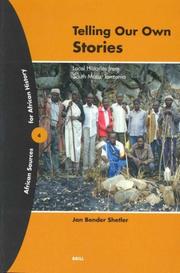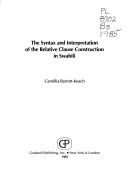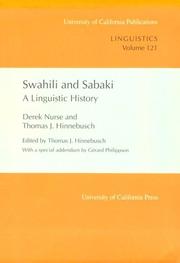| Listing 1 - 10 of 28 | << page >> |
Sort by
|
Book
ISBN: 9004626387 Year: 1979 Publisher: Leiden : BRILL,
Abstract | Keywords | Export | Availability | Bookmark
 Loading...
Loading...Choose an application
- Reference Manager
- EndNote
- RefWorks (Direct export to RefWorks)
Swahili language --- Swahili language --- Swahili language --- Noun. --- Declension. --- Foreign elements.
Book
ISBN: 311088903X Year: 2019 Publisher: Berlin ; Boston : De Gruyter Mouton,
Abstract | Keywords | Export | Availability | Bookmark
 Loading...
Loading...Choose an application
- Reference Manager
- EndNote
- RefWorks (Direct export to RefWorks)

ISBN: 9070176254 9070176386 9789070176389 9789070176259 Year: 1981 Volume: 5 Publisher: Dordrecht
Abstract | Keywords | Export | Availability | Bookmark
 Loading...
Loading...Choose an application
- Reference Manager
- EndNote
- RefWorks (Direct export to RefWorks)
Swahili language --- Grammar --- Syntax --- Grammar, Generative --- Kiswahili language --- Suaheli language --- Bantu languages --- Swahili language - Syntax --- Swahili language - Grammar, Generative
Book
ISBN: 1108047033 9781108047036 9781139207126 1139207121 Year: 2013 Publisher: Cambridge Cambridge University Press
Abstract | Keywords | Export | Availability | Bookmark
 Loading...
Loading...Choose an application
- Reference Manager
- EndNote
- RefWorks (Direct export to RefWorks)
Johan Ludwig Krapf (1810-81), a German-born member of the Church Missionary Society in East Africa, is regarded as the founder of Swahili studies in Europe. Having pursued an interest in Oriental culture from an early age, he first went to Abyssinia (Ethiopia) as a missionary. During his travels in Africa, he became the first European to see Mount Kenya; but he also considered the potential of Swahili as a lingua franca. Krapf published the first printed text in Swahili, and the first systematic Swahili grammar, as well as being the first to bring Swahili manuscripts to Europe. Another in a series of firsts is this lexicon, which was published posthumously in 1882. The Swahili dictionary, pioneering as it was in its day, is still of historical interest, especially because it contains notes on Swahili culture and customs, as well as an outline of the language's grammar.
Swahili language --- English language --- English language. --- Swahili language. --- English. --- Swahili. --- Grammar. --- Germanic languages

ISBN: 9789004492349 9789004126251 Year: 2003 Publisher: Leiden; Boston : BRILL
Abstract | Keywords | Export | Availability | Bookmark
 Loading...
Loading...Choose an application
- Reference Manager
- EndNote
- RefWorks (Direct export to RefWorks)
In this collection of ethnic group histories, written by authors from the Mara Region of Tanzania, local people tell their stories as a way to inspire development that builds on the strengths of the past. It combines histories from the small, but closely related, ethnic groups of Ikizu, Sizaki, Ikoma, Ngoreme, Nata, Ishenyi and Tatoga in South Mara, east of Lake Victoria and west of Serengeti National Park. Many of the authors compiled their stories by meeting with groups of elders. They were concerned to preserve history for the next generation who had not taken the time to learn the stories orally. The stories were written in Swahili and translated into English with annotations and an introduction so that readers not familiar with this region might also share in the experience. It also includes transcriptions of oral interviews with some of the same stories to get a sense of the ongoing conversions about the past. This collection makes local history told in a local idiom accessible to students of African history interested in social memory and the creation of ethnicity.
Group identity --- Oral tradition --- Swahili language --- Serengeti District --- History --- Texts
Periodical
ISSN: 16142373
Abstract | Keywords | Export | Availability | Bookmark
 Loading...
Loading...Choose an application
- Reference Manager
- EndNote
- RefWorks (Direct export to RefWorks)
Swahili language --- Swahili (Langue) --- Periodicals --- Périodiques --- Swahili language. --- Kiswahili language --- Suaheli language --- language --- literature --- anthropology --- history --- sociology --- swahili --- Bantu languages

ISBN: 0824054326 Year: 1985 Publisher: New York (N.Y.): Garland
Abstract | Keywords | Export | Availability | Bookmark
 Loading...
Loading...Choose an application
- Reference Manager
- EndNote
- RefWorks (Direct export to RefWorks)
Swahili language --- -Swahili language --- -Kiswahili language --- Suaheli language --- Bantu languages --- Relative clauses --- Syntax --- Relative clauses. --- Syntax. --- -Relative clauses --- Kiswahili language

ISBN: 0520097750 9780520097759 Year: 1993 Volume: 121 Publisher: Berkeley (Calif.): University of California press,
Abstract | Keywords | Export | Availability | Bookmark
 Loading...
Loading...Choose an application
- Reference Manager
- EndNote
- RefWorks (Direct export to RefWorks)
Bantu languages --- Swahili language --- Langues bantoues --- Swahili (Langue) --- History --- Histoire --- History. --- -Swahili language --- -Kiswahili language --- Suaheli language --- Kintu languages --- Ntu languages --- Sintu languages --- Benue-Congo languages --- -History --- Kiswahili language --- Swahili language - History. --- Bantu languages - History.
Book
ISBN: 0416108709 0416108504 Year: 1975 Volume: 3 Publisher: London Methuen
Abstract | Keywords | Export | Availability | Bookmark
 Loading...
Loading...Choose an application
- Reference Manager
- EndNote
- RefWorks (Direct export to RefWorks)
#SJ/LH/(6) --- Language policy --- Swahili language --- History. --- Swahili (Langue) --- History --- Histoire
Book
ISBN: 9004519661 Year: 2022 Publisher: Leiden ; Boston : Brill,
Abstract | Keywords | Export | Availability | Bookmark
 Loading...
Loading...Choose an application
- Reference Manager
- EndNote
- RefWorks (Direct export to RefWorks)
The present volume sets Swahili religious tracts available in Kenya and Tanzania in their context. The book starts with an overview of tracts in Swahili from the 19th century to the present day, an examination of Swahili as a religious language, and an introduction to Swahili versions of the Bible and Qurʾān. Chesworth then introduces the range of tracts currently available, examining eight in detail. In particular he considers how they present scripture in order to promote their own faith, Islam or Christianity, whilst denigrating the ‘other’. Finally, the volume discusses the impact from modern media on these tracts.
Tracts. --- Swahili language. --- Christianity and other religions --- Islam. --- Bible --- Qurʼan --- Criticism, interpretation, etc. --- Criticism, interpretation, etc.
| Listing 1 - 10 of 28 | << page >> |
Sort by
|

 Search
Search Feedback
Feedback About UniCat
About UniCat  Help
Help News
News